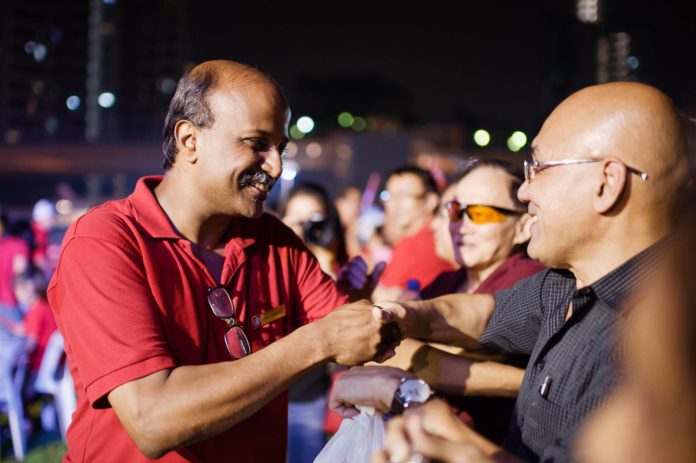SINGAPORE: Paul Tambyah exudes a good-natured amiability befitting any good doctor and teacher.
But the Professor of Medicine at the National University of Singapore and Senior Consultant at the Division of Infectious Diseases at National University Hospital dutifully reminds me that he is here in a completely different capacity.
“I have to get the disclaimer out of the way. Everything I say here is my personal opinion and has nothing to do with the university or hospital,” he says with a smile.
For good measure, I ascertain that his “personal opinion” encompasses his opinions as Chairman of the opposition Singapore Democratic Party (SDP), a post he was elected to in September last year.
“Of course,” he says with a grin.
At first glance, one may not detect the impassioned politician and activist that Dr Tambyah embodies. This facet of his personality emerges gradually as we talk about the state of Singapore’s politics, democracy and various policies.
But through it all, while critical of the PAP Government, Dr Tambyah maintains his affable demeanour and gives credit where credit is due.
For instance, while he feels that MediShield Life is inadequate in terms of making healthcare affordable to the masses, he acknowledges that it is “a huge advance in that it took in people with pre-existing conditions”.
Before we discuss his political career though, he tells me what attracted him to medicine. It was the “combined influences” of his parents. His father was a doctor and his mother, Leaena Tambyah, is a well-known advocate who was partly responsible for starting Singapore’s first school for students with multiple disabilities.
CIVIL SOCIETY ACTIVISM – “THREE STEPS FORWARD, TWO STEPS BACK”
In a way, it was his profession as an infectious diseases specialist that led to his activism and later, his political awakening.
“Worldwide, one of the most common infectious diseases is HIV, the virus which causes AIDS. It’s a disease which is associated with a lot of stigma and discrimination.”
He became involved in an advocacy group, Action for AIDS Singapore.
“They are activists who take steps to reduce stigma and discrimination. I saw that people in Singapore can make a difference if they feel strongly about something and if they can gather the evidence and the data, eventually the Government will change.”
His involvement in civil society intensified and later he became one of the founding members of human rights advocacy group MARUAH.
“But one of the things I realised is that there are limits to what civil society can do. Civil society can give feedback but ultimately, all the levers are still with the Government. If you really want to effect change, in fact, former prime minister Goh Chok Tong said that you have to join a political party.”
Dr Tambyah doesn’t entirely agree with this argument even though he has accepted “that’s the way it is in Singapore”.
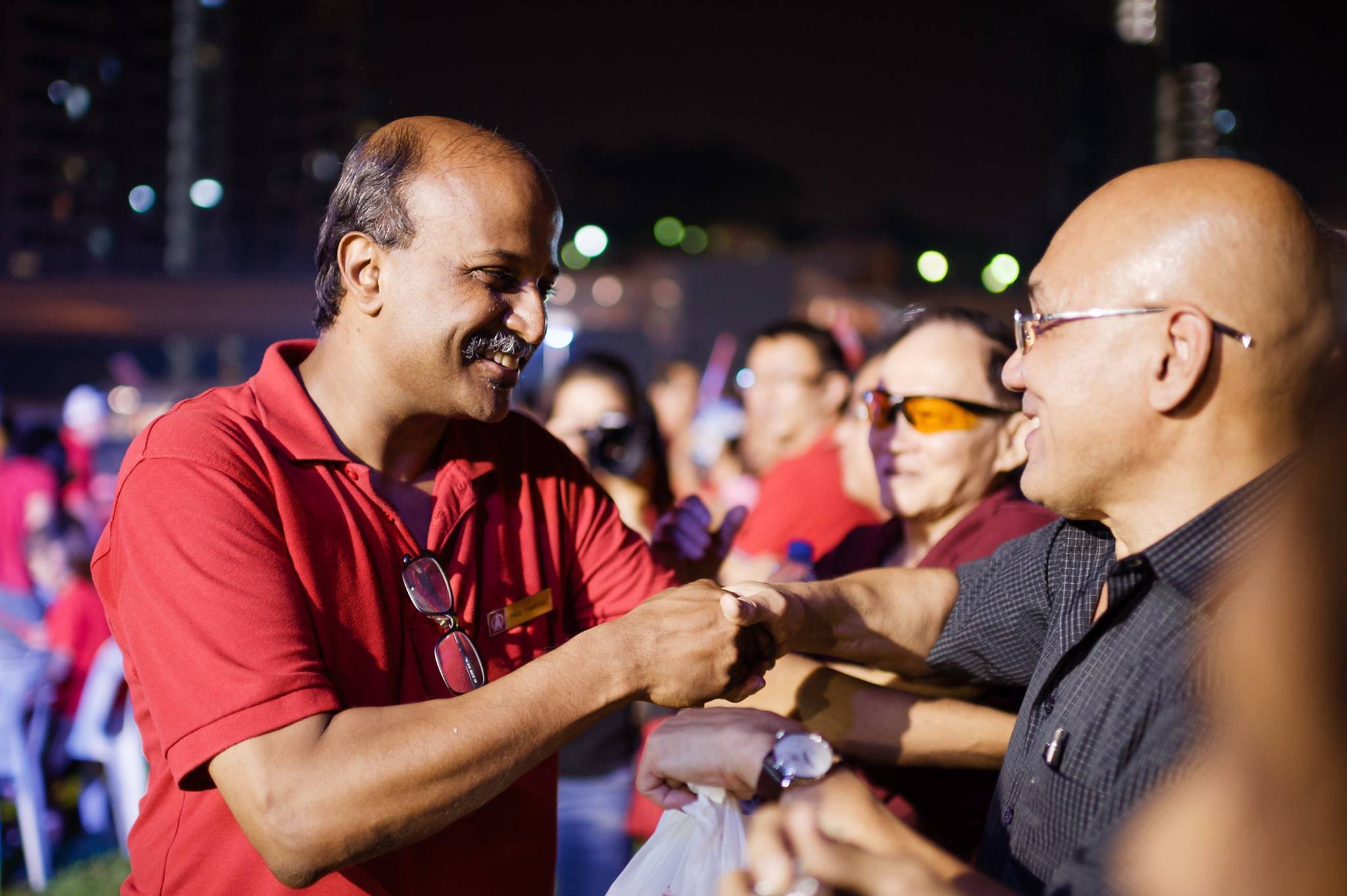
Paul Tambyah contested in Holland-Bukit Timah GRC in GE 2015. (Photo: Facebook / Singapore Democratic Party)
He compares civil society here to that in other developed countries where activists play a more significant role.
“There are fewer restrictions on civil society and civil society actually is encouraged. They often get grants from the government for various projects. There is a give-and-take with the government.
“You win some, you lose some, but you are treated with mutual respect and I think that is perhaps slightly lacking in civil society today in its interactions with the Government.”
He describes progress as being “three steps forward, two steps back”.
For example, MARUAH was gazetted as a political association and that, according to him, “severely limited” their ability to work with other civil societies or organisations outside of Singapore. They were also not allowed to accept foreign funding.
“MARUAH was set up for the Association of Southeast Asian Nations (ASEAN) human rights mechanism. But if they wanted to hold an event and invite human rights activists from the Philippines, they’d have to apply for permits. These are just barriers which make it difficult to move forward towards an ASEAN human rights mechanism.”
He also points to more restrictions on Hong Lim Park’s Speakers’ Corner in terms of “having to check IDs, to make sure we don’t have foreigners attending events”.
I ask him if he can see it from the authorities’ standpoint that there is a case for putting in place measures to guard against foreign interference.
“Definitely. You don’t want foreign interference and I think the worst thing is covert foreign funding. But when you are talking about something like ASEAN where there is, by its very nature, a collaborative effort amongst countries, I think that there has to be a place for transparent, well-documented foreign funding, if necessary, on a case-by-case basis and I think the blanket ban forces people to jump through hoops.”
“SPEAKING UP SHOULD BE CONSIDERED NATURAL … NOT AN ACT OF BRAVERY”
Dr Tambyah started getting involved in SDP activities in 2010. While he spoke at SDP rallies during the 2011 General Election (GE), his first GE as a political candidate was in 2015. He was part of the SDP team contesting Holland-Bukit Timah Group Representation Constituency (GRC). One of the main areas in which he wanted to effect change was healthcare financing.
“I was looking for a party with a very clear-cut ideology and the SDP is very much left-of-centre. It was in line with my own personal views on basic human rights, like housing, healthcare and basic education.”
I ask why he didn’t consider the Workers’ Party (WP), which had a presence in Parliament then.
“The WP haven’t published the same number of policy papers. I’m pretty sure they share very much the same views as we do on many of these issues but the SDP seemed to be willing to go out there and be heard.”
He admits his friends and family were worried that joining an opposition party would put his career in jeopardy.
“Lots of well-meaning people said to me, “Oh, you have to be careful”.
He recalls how after he gave a speech at an SDP rally in 2011, he went to Mount Elizabeth Hospital to visit a friend and people asked him if he was there to buy a clinic.
“They thought my days in the university were numbered and I think that when I got my promotion in 2013 to full professor with tenure, everybody was pretty shocked.”
He says while he, too, was worried initially, he “was tremendously reassured by the senior leadership of the university”.
“I think there are elements within the university who strongly feel that there is a need to speak up about issues which are important, as long as you do it in a responsible and rational way.
“The university has changed; I think it’s a lot more open but also social media has come into play. And you’ve seen what happened with Cherian George when he was denied tenure (at Nanyang Technological University, NTU). He had a voice and he was able to talk about it and I don’t think that NTU came out very well from that whole incident.”
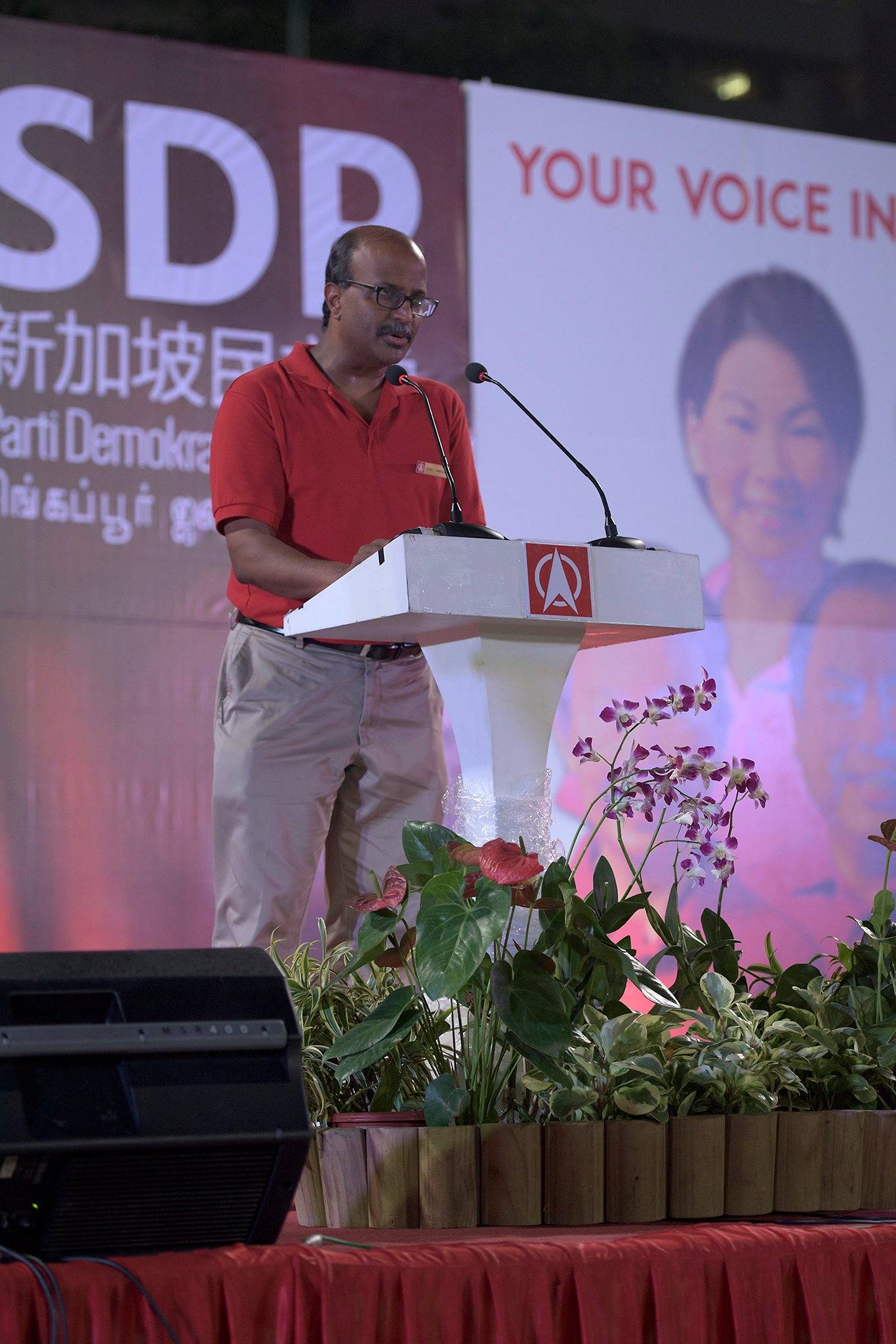
“Speaking up should be considered natural for citizens of a democracy, and not an act of bravery,” says Paul Tambyah. (Photo: Facebook / Singapore Democratic Party)
But I wonder if he would have gone ahead and joined an opposition party if it meant losing his job.
“First of all, I don’t think that anyone should lose their jobs or have their careers put in jeopardy for speaking up or championing an alternative narrative in a democratic society. At this stage in my career, I am fortunate to have options that many Singaporeans may not have. I am now an internationally well-known academic clinician who could possibly work in private medical healthcare in Singapore or in academic medicine overseas. But to reiterate, speaking up should be considered natural for citizens of a democracy, and not an act of bravery.”
THE PROBLEM WITH SELF-CENSORSHIP
While his own experience has been positive, he says it is still very hard for the SDP to attract candidates because of fears that involvement in an opposition party would jeopardise their livelihoods.
“We’ve had individuals within the SDP who are very talented, very capable. There’s actually an individual who was very active in the SDP and she said that she was told by people in her organisation that they are grassroots leaders and they don’t think it’s appropriate for her to be involved in an opposition party.
“I said, ‘That’s ridiculous. You should complain.’ But she said that they are the senior management so who can she complain to? You will get good people who have courage of their convictions but it is very hard to move people from the centre because they are just too afraid for their bread-and-butter.”
When I put it to him that this is possibly a function of self-inflicted fear, rather than people reacting to Government directives to discourage involvement in opposition politics, he agrees, but points out that “self-censorship is so much more effective than actual censorship”.
“Even though the Government doesn’t sack people because they are involved in opposition politics, there’s often that perception about that.”
He illustrates the power of perception with another example.
“You don’t have to lock people up. All you have to do is make them think that you are going to lock them up or think of somebody who was locked up 10 years ago or 15 years ago and when they censor themselves, it’s much more effective.”
Considering that he agrees this could be partly a manifestation of self-censorship rather than the ruling party issuing directives to organisations to discriminate against opposition party members, I ask him whether he thinks there’s anything the PAP can really do about it.
“The PAP Government is amongst the best in the world at running campaigns. All they need to do is run a campaign to say, join the opposition and your career in the civil service will take off. I mean that’s an extreme example but they could say, the civil service is independent. We’ve got people from the Workers’ Party. We’ve got people from the SDP. Feel free to speak up. Singapore is a diverse place which encourages views from all ends of the political spectrum.
“We could have little mascots and we could have bumper stickers and posters on buses and it’ll be tremendously effective.”
For a moment, I think he’s being facetious, but when he raises the suggestion again later in the interview, it dawns on me that he is serious.
He does feel certain actions by the authorities continue to fuel a climate of self-censorship. He cites as an example, the 2017 arrest of activist and artist Seelan Palay for presenting a performance art piece in tribute to political detainee Chia Thye Poh outside Parliament House.
POLITICS AND PARANOIA
The climate of “walking on eggshells”, as he describes it, is exacerbated by how the Government handles parliamentary debates.
He describes how he thinks the ruling party can better engage the opposition.
“Every time the Workers’ Party asks a question in Parliament, the Government could turn around and respond the way I might to a student who asks a question, and say, ‘Oh, that’s a really good question’, and start to deal with it.
“Instead, they turn around and they chide them. If you don’t have all the information and you ask a question, then you’re slammed and you’re asked to apologise like Sylvia Lim was asked to – that puts a certain amount of fear into individuals.”
He is referring to WP chairman Sylvia Lim being asked to apologise to the House earlier this year for alleging that the Government had floated “test balloons” before announcing an impending Goods and Services Tax hike.
Paul Tambyah goes On The Record with Bharati Jagdish.
I put it to him that most ruling parties would consider it a natural instinct to defend their policies and make a point of it if they feel the other parties are trying to cast aspersions on their intentions.
“But still, there has to be some degree of balance because otherwise it’s going to backfire. The whole Sylvia Lim example, I think it won Sylvia a lot of sympathy points – the fact that people are trying to make her apologise for asking an honest question. You can say that the question is a stupid question, you can try to criticise her for that, but trying to make her apologise for asking a question seems to be a little bit like shooting yourself in the foot because it makes you come across like a bully.
“In a parliamentary democracy, if somebody asks you a question, you can make them look small or really silly, but to treat every question as an attack on your own personal integrity, to me, that’s bordering a little bit on paranoia.”
CAN THE SDP CONVINCE VOTERS?
We move on to talking about why the SDP has not made any headway in winning parliamentary seats, not even in the 2011 election.
“You must remember, we were going from a state where the party was almost non-existent. It was the subject of several lawsuits. It was on the verge of bankruptcy and to get over 30 per cent of the vote, I think, was a pretty significant achievement.”
I wonder why the party’s baggage didn’t discourage him from joining it.
“The fact that they persevered despite all of the slings and arrows that had been flung against them, that was very impressive because that shows a certain kind of courage of your convictions.”
But he feels that media coverage favouring the ruling party has worked against them.
“In 2015, on Cooling-off Day, the front-page headline on The Straits Times was Mr Khaw Boon Wan saying you may not get a PAP government. There were these WhatsApp messages going around with fake bookie odds. No one has ever owned up to propagating trying to scare people into thinking that the PAP would lose the 2015 election despite all indicators pointing in the opposite direction.”
He also cites the difficulties the party faces in holding community events as securing venues run by town councils and the People’s Association is challenging.
He puts this down partly to the “self-censorship” phenomenon we discussed earlier.
“But I’m an optimist. I don’t think that this self-censorship is going to be able to continue forever and if social media develops and as people become more open, then I think the PAP will realise that they need to come down on these people who are second-guessing them and tell them ‘Hey, loosen up. We are not going to give you a phone call and tell you to not allow them. Let them have their event in some basketball court’.”
But the PAP’s ability to mobilise state resources in other ways is “very, very difficult to try to go up against”, he says.
“During my first clinic session after the election, a patient of mine who I’ve been treating for many years wheeled himself into the room in his motorised wheelchair and he said, ‘Doc, you guys ran a good campaign. Too bad you all lost.’ I said, ‘Thank you. By the way, where do you live?’ Then he said, ‘We live in Yuhua, but you know, (Minister) Grace Fu gave us this wheelchair.’ Then I said, ‘She didn’t give you the wheelchair. This is paid for by your taxes’.
“He said, ‘No, no no, she came to my house with an entourage of people, with her photographers and she gave me the wheelchair’.”
Even though Dr Tambyah says he reiterated that ‘it’s your money that went into this wheelchair’, his patient ‘refused to accept’ it.
“This was a guy I’d been looking after for 10 years. He knew me. We got on with each other very well. But at the same time, he felt indebted to the ruling party politician because she was able to, in his mind, provide him with mobility.”
However, I put it to him that if the PAP Government lets Singaporeans down, and if the opposition manages to come up with better policies, they could get the votes regardless of the PAP’s party machinery.
Considering the way Singaporeans have voted in the last two elections, I suggest to him that Singaporeans don’t see the point of an opposition party or don’t consider the opposition parties, including the SDP, as being worthy of a vote or as being able to govern.
But he reiterates that the various hurdles prevent the SDP from truly convincing voters of the party’s merits, even thought they “have really dedicated volunteers, and for Single Member Constituencies (SMCs) they can cover almost every household at least twice”.
“The administrative constraints, the media constraints and the self-censorship issues affect people. Even social media is constrained by the licensing issue and the various actions that have been taken against individuals for crossing the poorly defined Out of Bounds or OB markers. This deprives Singaporean voters of essential information we need to allow us to cast a ballot for the people most able and willing to take care of our interests and well-being.”
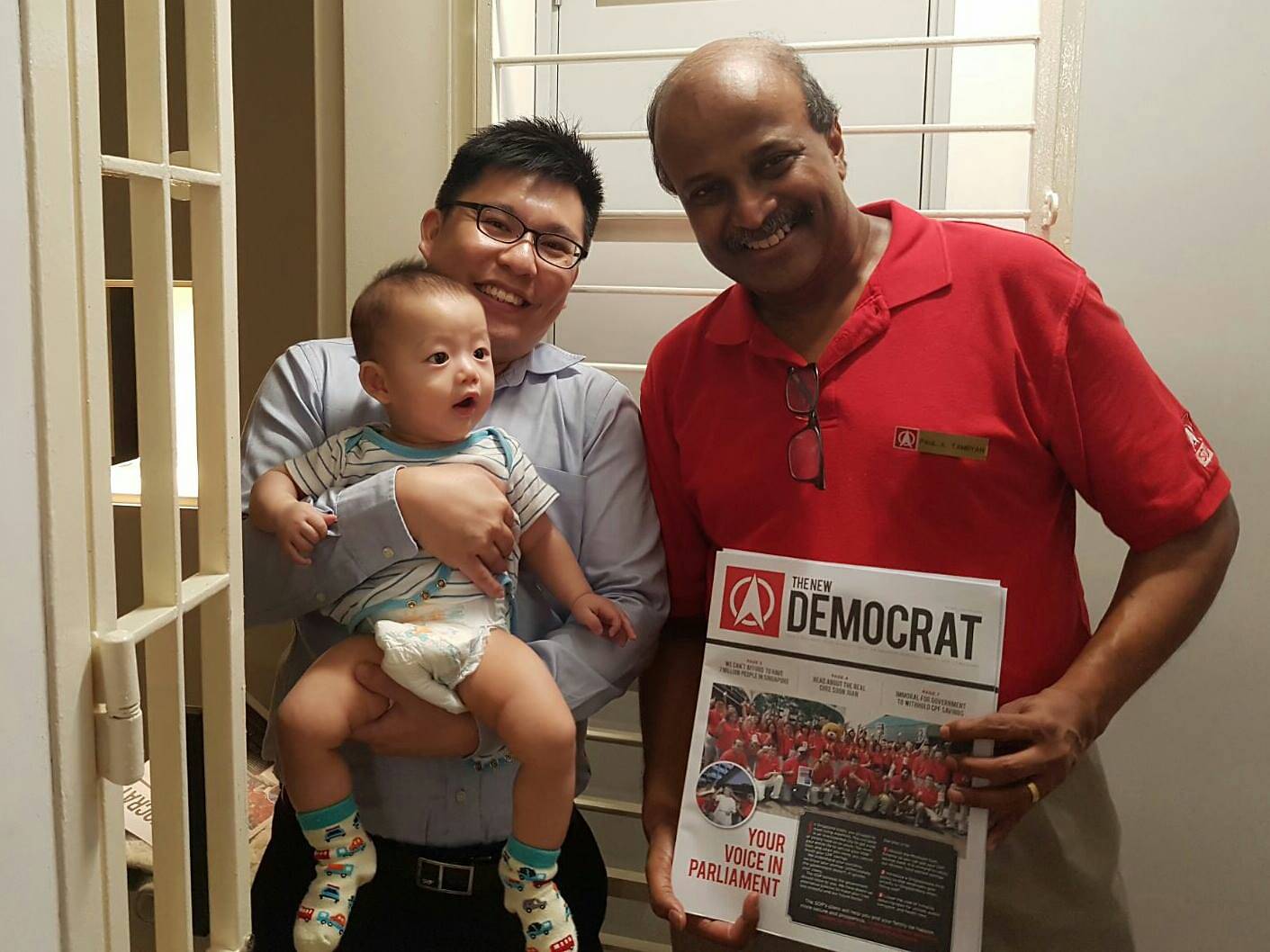
Paul Tambyah meeting residents on a house-to-house visit. (Photo: Facebook / Paul Tambyah)
AN INDEPENDENT ELECTION COMMISSION AND MORE SMCs
However, could upcoming changes help?
For instance, Prime Minister Lee Hsien Loong has said Singaporeans are likely to see smaller GRCs on average and more SMCs in the next election.
Some analysts have said this could help opposition parties who generally have fewer resources to put together large teams, but Dr Tambyah is “cynical” about this.
“You can design three-member GRCs very strategically. You could arrange it such that these three-member GRCs are all in constituencies that you could win.”
He says what he would like to see instead is “an independent Election Commission” that could ensure that “electoral boundaries will be drawn up with all the parties and civil society and all the individuals involved”.
At this point, the Election Commission is under the Prime Minister’s Office.
He also suggests “a return to all single-member constituencies”.
“Before the GRCs came up, Singapore has always had a multi-racial parliament. We’ve always had members of parliament from the Malay and Indian communities, and the proportion of people from the minority communities actually was highest in the earliest years when we were all single-member constituencies. So, I don’t buy the argument that GRCs are essential for racial representation.”
I point out a survey that showed when it comes to deciding who should hold the nation’s highest positions, Singaporeans prefer it be someone of the same race as they are.
“But obviously that was not borne out by the facts. Like in the Bukit Batok by-election, Mr Murali Pillai won handily against SDP Secretary-General, Dr Chee Soon Juan. It was the first by-election the PAP has won since 1992 and it was quite obvious that there was somebody from a minority race who was able to win. I think those surveys have to be taken with a pinch of salt.”
HEALTHCARE AND HOUSING
Aside from the politics though, the policies matter.
From the very beginning of his political life, Dr Tambyah has been campaigning for a better healthcare financing system.
He still feels that MediShield Life, for instance, needs to be improved. Most notably, the high deductibles concern him.
“Healthcare is a right, not charity”, he says and cites research that showed the state of healthcare financing in the early days of Singapore.
“In 1960, the World Health Organization sent a delegation to Singapore in Malaya to study the healthcare system. Our health minister at that time was Ahmad Ibrahim and he pointed out that Singapore had a pretty decent healthcare system in 1960. The unique thing about it was that it was all free at the point of care. They introduced the S$1 charge at the Outpatient Dispensaries (OPDs) and I think it was a S$5 charge for the inpatients.”
That was how, he says, Singapore’s healthcare system operated right up till the mid-80s.
“In 1983, when we had the blue paper on Singapore healthcare, Singapore had an infant mortality rate that was lower than the UK and the US. So we had really good health outcomes with very cheap healthcare and that I think shows that it’s achievable. If you wanted to pay a bit more to stay in some private hospital, you could but basically, you should not have to worry about getting your cancer treated or your bypass done because it could be done for a really cheap price if the government was the sole proprietor.”
Dr Paul Tambyah has been campaigning for a better healthcare financing system.
He feels that the privatisation of healthcare was a “mistake”, but wouldn’t an entirely state-run system run the risk of being inefficient?
He acknowledges this and suggests instead a national universal health insurance system where the government takes over administering insurance, but not the provision of services.
“The government is the financier but not the provider. This is what happens in Australia and France. Also Germany to a certain extent.”
His vision includes basic healthcare with minimal deductibles and co-payments.
When I raise the risk of overconsumption under such a system, he says it may not be a direct effect of enhanced insurance.
“There is no direct evidence that significant numbers of patients are going out of their way to subject themselves to unnecessary surgeries or treatments just because these are paid for by insurance riders or free. Most people do not like to see the doctor or subject themselves to chemotherapy or injections or to take bitter medicines.”
He says that cases of overconsumption that we are seeing today could be due to other reasons.
“There is an asymmetry of information. Most people have a very limited knowledge of medicine or medical procedures and depend on their healthcare providers for the information that they need to make decisions about what procedures and treatments are best to deal with their ailments.
“Healthcare costs have risen in Singapore for many reasons including, primarily, the commercialisation of healthcare which has led to the need to provide returns to shareholders who own major healthcare providers. This leads to incentives which distort the market by rewarding overconsumption of resources.”
For example, he says some patients do certain tests and procedures as inpatients to “claim insurance benefits” and thus maximise profits for the owners of the healthcare infrastructure, rather than as outpatients which would have been cheaper.
“The doctor becomes an employee who has to answer to the shareholder while at the same time, maintain an ethical practice towards his patients. So it’s a huge challenge.”
He also points out that the medico-legal environment in Singapore and elsewhere may encourage doctors to potentially over-investigate patients for fear of litigation or being accused of negligence.
“A well-run, evidence-based national health insurance scheme similar to what is proposed in the SDP Healthcare Plan would avoid the problem of overconsumption by restricting benefits to those procedures which are proven and supported by solid scientific evidence,” he says.
To finance Singapore’s future needs such as healthcare, naturally, more funds will be required. I ask him how best he thinks these can be generated.
“In Singapore currently, you don’t have pay estate duty, you don’t have to pay capital gains tax, you don’t have to pay tax on dividends, you don’t have to pay tax on fixed deposits interests.”
He thinks it’s time Singaporeans do.
But might this make Singapore less competitive as a wealth management hub?
“I don’t think so because I think we have the skillset, individuals with the talents, the infrastructure, so if we just went back to some kind of a more equitable, a progressive taxation system, I don’t think that we’ll undersell ourselves. These are people who are just parking their money here. If they paid a little price, I don’t think they would feel it that badly.”
Among the other policy issues that concern him is housing.
“Somewhere along the way, public housing lost its focus. Instead of becoming a basic human right to have a roof over your head, with the asset enhancement policy, it became a tool for multiplying your wealth or a vehicle for speculation.”
He calls it a “misguided” approach to public housing.
When I remark that many Singaporeans have, in fact, benefited from this, he says it’s just a “short-term gain”.
“If you’ve got more money, then you should invest in private property.”
He also points to how the Ministry of National Development has recently highlighted the limits of HDB leases.
“I think the Government is going to deal with it. They’re probably going to extend the lease. It’s too much of a political time bomb.”
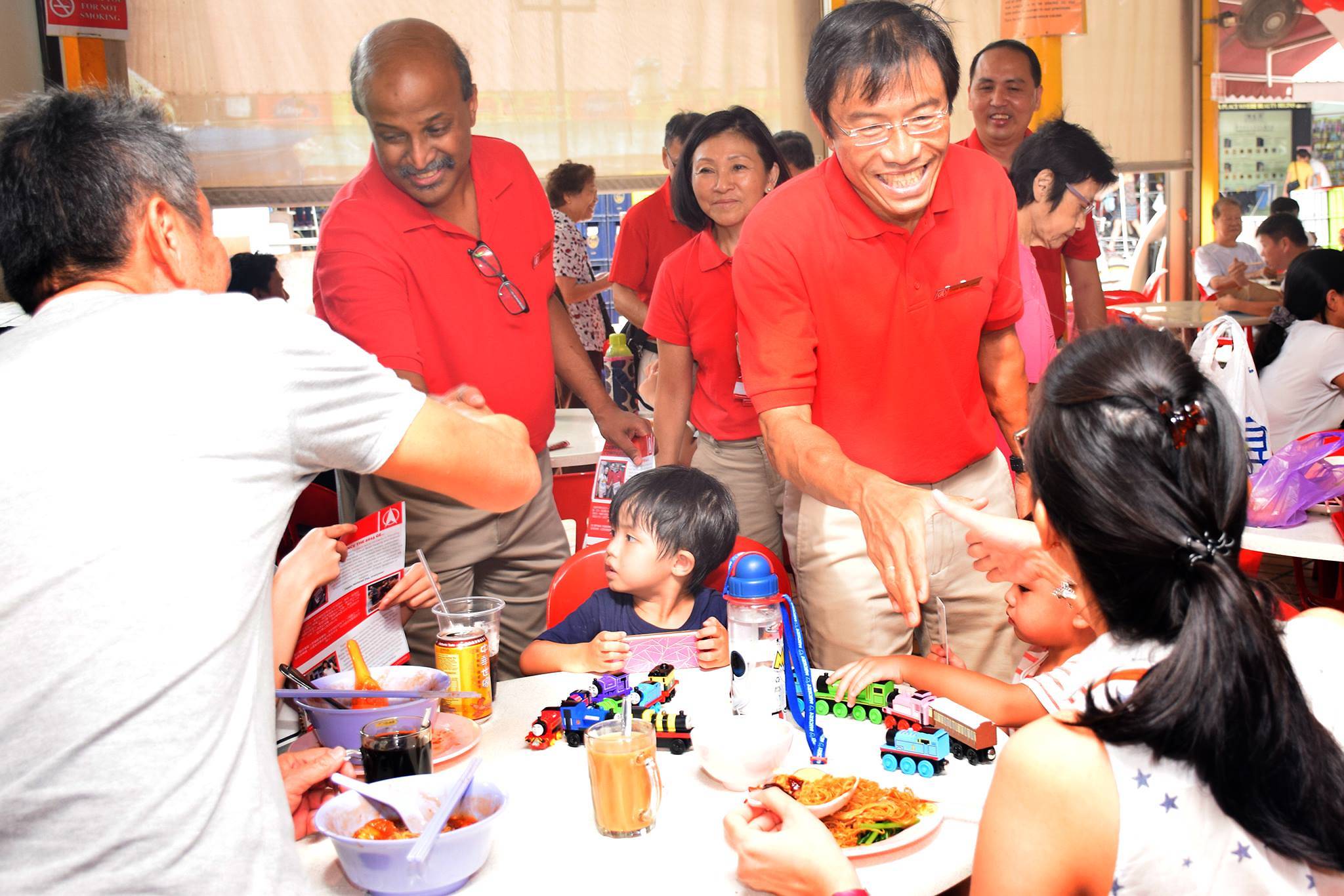
Paul Tambyah with SDP Secretary-General, Chee Soon Juan. (Photo: Ryan Smith)
THE FUTURE OF SINGAPORE’S OPPOSITION
As we progress to talking about the future of the opposition in Singapore, something that he says is “on the cards” is an opposition alliance.
The SDP recently invited members of all the other political parties to a forum where it became apparent to him that their ideologies could be aligned.
“We recognise that we probably have more in common than actually what separates us. Most of us are in favour of transparency, accountability, more social justice.
“Dr Tan Cheng Bock was invited and he was going to come for our event but something happened at home, so he couldn’t make it but he sent three of the senior members of his team and they were there. So we think that a figure like him, who has been in Parliament, who has run election campaigns successfully, could be a catalyst to bring people together.”
When asked what role Dr Tan could formally play, Dr Tambyah doesn’t seem certain.
“I don’t know what he’s going to do but all he needs to do, if he decides to form his own political party, is to draw all the other parties to form a coalition. There are many different possibilities as to what he could do.”
This and the idea of an alliance is “an ongoing conversation”, he says.
I wonder how his party plans to convince voters of its merits in the next election considering the PAP’s performance in the last election and the new policies it has introduced since 2011.
“There have been schemes such as the Silver Support Scheme and the MediShield Life which are baby steps towards a national old-age pension and a comprehensive national health insurance policy respectively. However, both are limited severely in terms of the quantum provided (up to a maximum of $250 a month) for the Silver Support Scheme or the high deductibles for MediShield Life.”
He also raises other issues that Singaporeans seem concerned about.
“Prices were raised across the board for water and electricity. We in the SDP consider healthcare, affordable housing and equitable quality education as basic human rights which should be guaranteed to everyone not dispensed as charity or traded as commodities. The one-party system is a dinosaur which is overdue for extinction in Singapore.”
His ideal vision of a democracy is one that includes many political parties.
“I think what’s important is that there will be a free discussion of ideas, a thinking-through of plans of what’s good for Singapore.”
I ask him what he thinks of suggestions from some quarters that Singapore doesn’t need a multi-party system in order for good governance to be the order of the day.
“I think history tells us otherwise. What’s happened in Mexico, Taiwan and Malaysia is that single-party rule cannot survive for too long because it becomes fossilised. No matter how good you are, you just become fossilised and that’s just the order of things because you need people to keep you on your toes.
“You need to have time spent in opposition. Like in Japan, the Liberal Democratic Party was in opposition for a short period of time and then they came back and they came back better. So I think this is something that is inevitably going to happen.”
